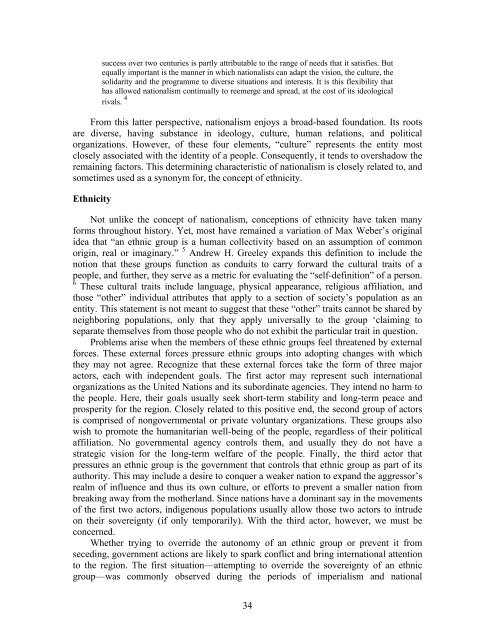Global Security Concerns - Project Gutenberg Consortia Center
Global Security Concerns - Project Gutenberg Consortia Center
Global Security Concerns - Project Gutenberg Consortia Center
You also want an ePaper? Increase the reach of your titles
YUMPU automatically turns print PDFs into web optimized ePapers that Google loves.
success over two centuries is partly attributable to the range of needs that it satisfies. But<br />
equally important is the manner in which nationalists can adapt the vision, the culture, the<br />
solidarity and the programme to diverse situations and interests. It is this flexibility that<br />
has allowed nationalism continually to reemerge and spread, at the cost of its ideological<br />
rivals. 4<br />
From this latter perspective, nationalism enjoys a broad-based foundation. Its roots<br />
are diverse, having substance in ideology, culture, human relations, and political<br />
organizations. However, of these four elements, “culture” represents the entity most<br />
closely associated with the identity of a people. Consequently, it tends to overshadow the<br />
remaining factors. This determining characteristic of nationalism is closely related to, and<br />
sometimes used as a synonym for, the concept of ethnicity.<br />
Ethnicity<br />
Not unlike the concept of nationalism, conceptions of ethnicity have taken many<br />
forms throughout history. Yet, most have remained a variation of Max Weber’s original<br />
idea that “an ethnic group is a human collectivity based on an assumption of common<br />
origin, real or imaginary.” 5 Andrew H. Greeley expands this definition to include the<br />
notion that these groups function as conduits to carry forward the cultural traits of a<br />
people, and further, they serve as a metric for evaluating the “self-definition” of a person.<br />
6 These cultural traits include language, physical appearance, religious affiliation, and<br />
those “other” individual attributes that apply to a section of society’s population as an<br />
entity. This statement is not meant to suggest that these “other” traits cannot be shared by<br />
neighboring populations, only that they apply universally to the group ‘claiming to<br />
separate themselves from those people who do not exhibit the particular trait in question.<br />
Problems arise when the members of these ethnic groups feel threatened by external<br />
forces. These external forces pressure ethnic groups into adopting changes with which<br />
they may not agree. Recognize that these external forces take the form of three major<br />
actors, each with independent goals. The first actor may represent such international<br />
organizations as the United Nations and its subordinate agencies. They intend no harm to<br />
the people. Here, their goals usually seek short-term stability and long-term peace and<br />
prosperity for the region. Closely related to this positive end, the second group of actors<br />
is comprised of nongovernmental or private voluntary organizations. These groups also<br />
wish to promote the humanitarian well-being of the people, regardless of their political<br />
affiliation. No governmental agency controls them, and usually they do not have a<br />
strategic vision for the long-term welfare of the people. Finally, the third actor that<br />
pressures an ethnic group is the government that controls that ethnic group as part of its<br />
authority. This may include a desire to conquer a weaker nation to expand the aggressor’s<br />
realm of influence and thus its own culture, or efforts to prevent a smaller nation from<br />
breaking away from the motherland. Since nations have a dominant say in the movements<br />
of the first two actors, indigenous populations usually allow those two actors to intrude<br />
on their sovereignty (if only temporarily). With the third actor, however, we must be<br />
concerned.<br />
Whether trying to override the autonomy of an ethnic group or prevent it from<br />
seceding, government actions are likely to spark conflict and bring international attention<br />
to the region. The first situation—attempting to override the sovereignty of an ethnic<br />
group—was commonly observed during the periods of imperialism and national<br />
34






